- Artificial Intelligence in HR: How AI Is Reshaping the Future of Human Resources
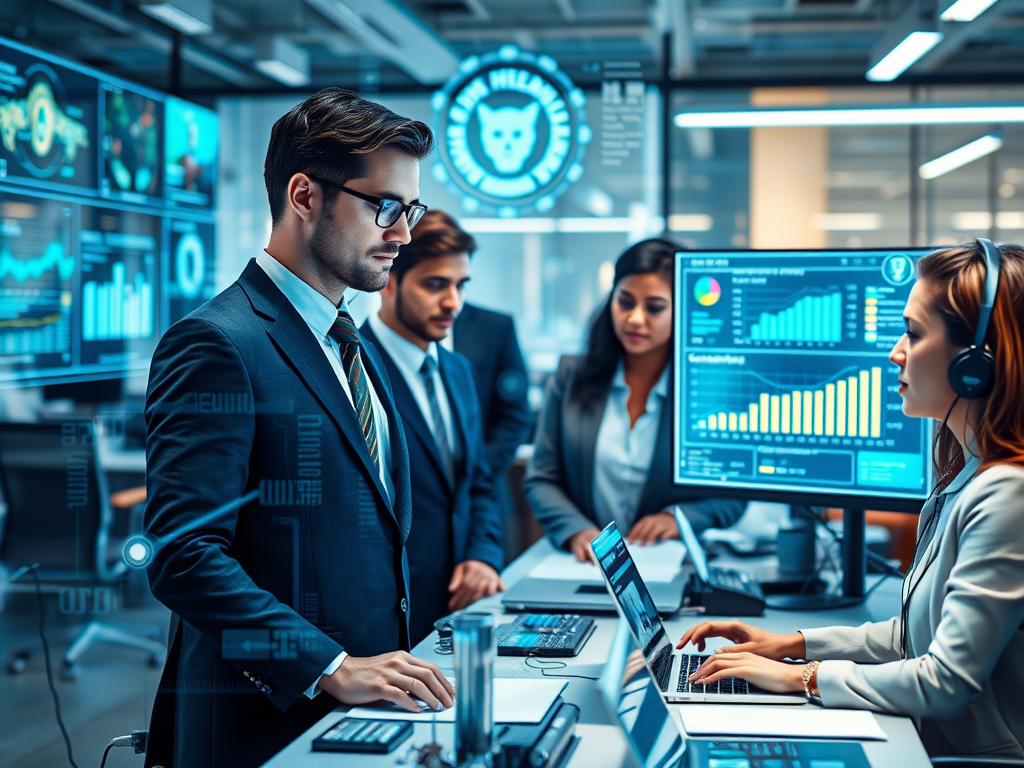
Artificial Intelligence is rapidly transforming the face of the business world—and Human Resources is not far behind. From being a function governed by instincts and personal relationships, HR today finds itself in the midst of a data-driven, automated, smart algorithm-driven revolution.
From scanning thousands of resumes in seconds to identifying which employees are most likely to leave, AI is empowering HR organizations with so much more than spreadsheets and gut feel. It’s not just about time savings—it’s about making better, faster, and more data-driven decisions across the employee lifecycle.
But what exactly is AI in HR like in practice? How is it enhancing recruiting, employee engagement, and workforce planning? And what are the problems companies need to overcome to leverage it ethically?
In this article, we will discuss how artificial intelligence is being used in Human Resources today, the benefits it provides, the traps to avoid, and what the future of work looks like when humans and algorithms collaborate.
The History of AI in Human Resources
Human Resources was always human—it’s just been technology that, over time, has continually reshaped the ways in which HR professionals go about their work. The past two decades saw us move away from paper, handwritten processes and migrate to cloud systems that monitor it all—absence requests through to appraisals. But now, thanks to artificial intelligence, we see the next significant step change: a smarter, data-fitted way to deal with people.
From Transactional to Strategic
In the first decade of the 2000s, the digitization of HR began with the most basic HR information systems (HRIS) to centralize employee data. With the progress of technology, HR organizations adopted applicant tracking systems (ATS), payroll automation, and self-service portals. These tools improved the efficiency of operations but still required heavy manual entry.
AI is a disruptor because it introduces intelligence, automation, and forethought. Instead of reacting to issues, HR departments can now be proactive. Instead of scrolling through resumes by hand, AI can shortlist candidates within minutes based on advanced criteria. HR’s role is moving away from administration and in the direction of strategic talent management.
The Rise of AI in HR Technology
Over the past few years, large HR technology platforms have integrated AI into their core products. Over 40% of large businesses currently use some type of AI in their HR processes—and that number is growing fast, says Deloitte.
The main enablers for this adoption are: • The need to hire more urgently and accurately in tight labor markets. • The HR data explosion (from applications, surveys, engagement tools). • The rising need for digital-first, personalized employee experiences.
AI technologies are helping HR staff with everything from predictive recruitment to tracking the health of employees—enabling them to deliver better results for the business and for its people.
Takeaway: The future of AI in HR isn’t replacing human judgment—improving it. By automating routine tasks and putting actionable insights front and center, AI enables HR professionals to do what they do best: construct a successful, productive workforce.
Large Applications of AI in HR
Artificial intelligence is no longer just a buzzword in HR—it’s actually revolutionizing how businesses find, attract, and manage talent. AI is being used to every step of the employee lifecycle, from recruitment to retention, and is delivering unprecedented levels of accuracy, customization, and velocity.
Let’s dive into where AI is having the greatest influence.
Recruitment and Talent Acquisition
Getting the right people on board has always been a priority—and one of HR’s most labor-intensive activities. AI is revolutionizing this stage by: • Mass screening comes back: Candidate tracking systems powered by AI can screen thousands of resumes in minutes, weeding out applicants based on skills, experience, and job fit. • Identifying successful candidates: Machine learning models sort through past hiring data to discover trends that are connected with top-performing employees. • Increasing diversity: Some tools anonymize resumes to minimize unconscious bias at screening.
Example: One large retail chain cut their time-to-hire in half through AI pre-screening and grading of candidates for seasonal jobs.
Onboarding
A smooth onboarding process sets the tone for an employee’s journey. AI helps by: • Routine work automation: AI workflows and chatbots reduce human coordination, from document collection to system access. • Customizing the experience: AI can suggest training modules or introduce co-workers depending on the new employee’s position and history. • FAQs: Virtual assistants can respond to frequently asked questions during onboarding 24/7.
Outcome: Decreased ramp-up time and improved first-year retention.
Employee Engagement and Retention
Employee engagement matters—but is hard to measure. AI software is changing that: • Sentiment analysis: AI monitors employee sentiment in the form of performance reviews, chat logs, or surveys to detect frustration or disengagement. • Real-time pulse surveys with analysis: Adaptive feedback tools identify trends by department, location, or job. • Attrition prediction: Some platforms predict the most probable employees to leave based on performance and behavioral metrics.
Pro tip: Reduced turnover and better morale are the outcomes of early intervention.
Performance Management
Regular performance reviews are traditional and subjective. AI facilitates: • Continuing feedback cycles: Product data and project commentary are processed by systems to yield constant input. • Alignment of goals: AI suggests development opportunities aligned with company goals and employee goals. • Reducing bias: Neutral standards reduce managerial bias in assessments.
Bonus: Workers receive more actionable, personalized recommendations.
Learning and Development
Today’s employees need training more frequently than annually. AI makes learning adaptive: • Customized learning paths: AI recommends courses based on role, skill gap, and career goals. • Training triggers: Smart notifications remind the employees to train at the right time. • Skills mapping: AI helps HR to identify future stars and upskill employees for future roles.
Example: A global software company used an AI to match employees with microlearning modules, increasing skill gain and internal mobility.
Bottom line: AI enhances each step of the HR process—not by replacing humans, but by equipping HR teams with the intelligence and automation they need to focus on what matters most: people.
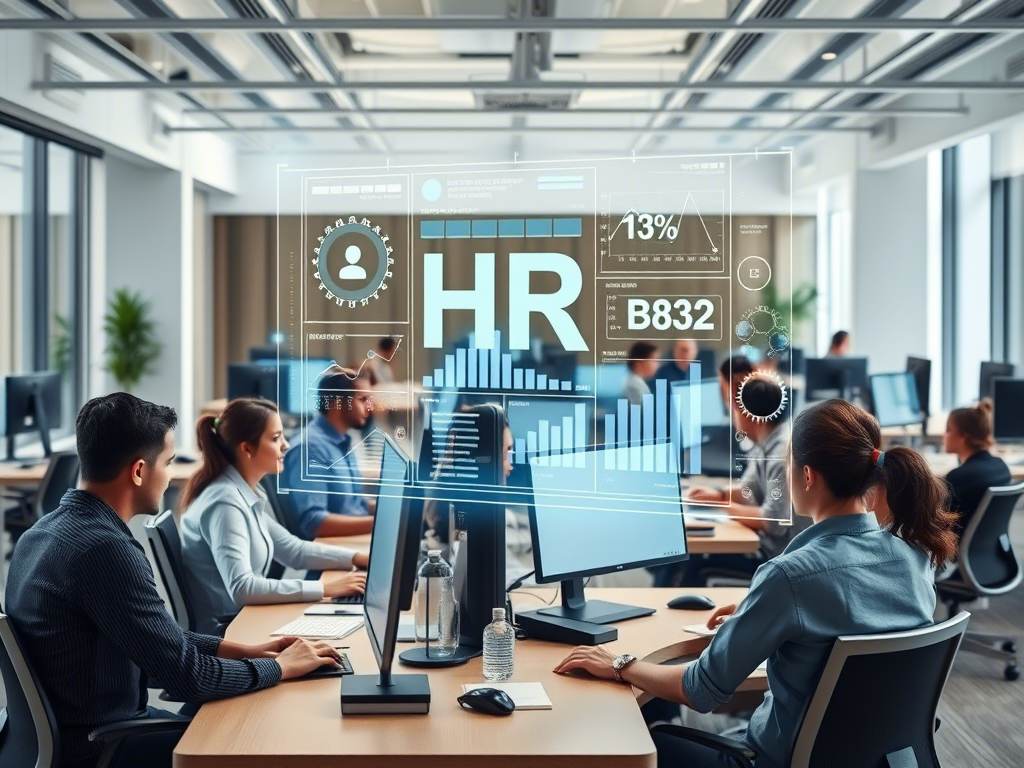
Benefits of AI Integration in HR Practices
Placing AI in HR isn’t an upgrade to an application—it’s a rethinking of organizational strategy to talent, productivity, and the HR function itself. AI introduces an order of velocity, accuracy, and strategic insight that was unachievable by hand, and the benefits ripple across the full employee lifecycle.
One of the most tangible advantages is the efficiency AI brings on time-consuming, redundant activities. Consider how much time recruiters typically waste manually screening resumes, scheduling interviews, or answering onboarding questions. With AI, these are done for them, enabling HR professionals to spend their time on higher-value activities like culture development, manager coaching, or designing growth programs. For companies handling large volumes of applications or having a dispersed workforce, the time saved can be transformative.
In addition to efficiency, AI also enhances decision-making in ways previously beyond its capabilities. Human HR decisions have long rested on experience, observation, and maybe gut instinct. Useful as those are, however, they are also subject to bias and narrow focus. AI, on the other hand, analyzes large amounts of structured and unstructured data—from application files to internal surveys—to reveal insights that might not otherwise be visible. That enables HR teams to make more informed decisions about whom to hire, how to address performance, or when to step in on troublesome employees.
A second benefit that is frequently underappreciated is how AI improves the candidate experience and the employee experience. In recruitment, for example, AI can deliver faster communication, personalized messaging, and better job suggestions—all to enhance the candidate experience. Post-hire, employees benefit from the benefit of smart tools to learn, match to internal roles, or get policy questions answered in real time through AI-powered chat. The result is an organization that is more responsive, more personalized, and more supportive.
Most importantly, these benefits don’t require HR departments to be technically proficient. Most of the AI solutions available today are programmed to seamlessly work with existing HR systems and have intuitive interfaces that focus on ease of use. And although installation does require planning and administration, the payoff over time—time saved, insights acquired, and experiences enriched—makes AI one of the smartest investments an HR department can make today.
Most important takeaway: The true value of AI for HR is not automation but transformation. By freeing the operational weight and raising wiser insights, AI allows HR leaders to transition to a more strategic role, shaping the future of work rather than reacting to it.
Challenges and Considerations
While the benefits of AI in HR are compelling, they are not without their challenges. The application of AI brings a series of challenges that must be thoughtfully weighed—not only on a technical or functional basis, but on an ethical and cultural basis as well. With any new technology, success is not so much what AI can do, but how thoughtfully it’s applied.
Most important, perhaps, is data security and privacy. HR operations handle some of the most intimate information within an organization—salary data, medical information, performance appraisals, even personal email. Add AI solutions to the mix, and the questions are inevitable: How is the data being collected and stored? Who can see it? What are the controls for misuse or improper disclosure? To establish trust and show compliance with data protection regulations like GDPR or CCPA, organizations must invest in secure AI solutions, have open data governance policies, and ensure that employees understand how their data is being used.
The other critical challenge is bias. AI is no more objective than its training data—and unfortunately, many datasets carry the scars of historical human bias. An algorithm learned from historical hiring decisions that were biased in favor of specific groups may replicate or even amplify those same biases in subsequent recommendations. It has real-world consequences: the potential to perpetuate inequality, limit diversity, or exclude qualified candidates on grounds that should be irrelevant. Its solution is not merely technical solutions like bias detection and unbiased training data, but also organizational prudence and human judgment.
And then there’s change management. Some employees will welcome AI as a resource, but others will view it as a threat to their raison d’etre, skill set, or autonomy. That’s especially true in HR, where soft skills and human judgment are the most valuable assets. To thrive, organizations must create a culture of trust around AI, one that frames the technology as a support system, not a replacement. That takes open communication, participatory training, and engaging HR practitioners in the effort from the start.
Lastly, organizations must avoid the trap of over-automation. Not all problems are best solved by an algorithm. There remain plenty of rooms for HR—conflict resolution, team dynamics, career coaching—that need empathy, subtlety, and real human presence. AI can definitely augment these processes, but never substitute for them. The key is balance: machines can handle data, and humans with relationships.
Main point: Getting AI into HR is less about putting in a tool and more about intention. Organizations will have to consciously deal with ethical risks, technical constraints, and cultural change in order to get the most out of the full potential of AI while staying true to the people-focused mission of HR.
Case Studies: AI Transforming HR in Organizations
We can witness the real potential of AI in HR when we look at how businesses are implementing it. Businesses of all sectors are using innovative applications of AI—not just to automate transactions, but to solve fundamental issues, improve the employee experience, and make HR more of a strategic driver for the firm.
Let’s have a closer look at two case studies explaining how AI is transforming HR processes and outcomes.
Case Study 1: Maximizing Recruitment for an International Logistics Company
Confronted with accelerating growth and seasonal turnover in the tens of thousands, an international logistics company had to efficiently process large numbers of job applicants at low cost—without compromising candidate quality. Their current hiring process took too long, with the company losing potential talent and experiencing recruiter burnout.
The company launched an AI-based hiring platform that would screen resumes automatically, match the candidates to available job openings based on experience and qualifications, and even conduct initial video interviews using natural language processing to assess the responses. It took days for what previously would have taken weeks. The applicants received instant feedback, and the hiring managers had to deal with only high-quality candidates.
The result? A 62% reduction in time-to-hire, a 25% increase in offer acceptances, and a more diverse group of qualified candidates. Just as important, the HR staff reported that they had more time to focus on onboarding and employer branding—rather than being bogged down screening resumes.
Case Study 2: Predictive Analytics for Enhancing Employee Retention
One quickly growing technology company saw growing turnover among mid-level engineers, despite offering competitive wages and excellent benefits. Exit interviews yielded such broad responses as “career growth” or “lack of fit,” but no pattern was discernible.
The company looked to AI in an attempt to attain a deeper level of understanding. Through combining information from employee engagement surveys, project feedback, and even internal messaging (with privacy safeguards in place), their AI system detected signs of disengagement—such as lower levels of participation in team meetings, late assignment submission, or a sudden halt in internal messaging.
Instead of waiting for people to resign, the HR department actively went to vulnerable employees and proposed mentorship programs, project redesign, or personal career development plans. Attrition among the target group fell by 38% in one year. Employees felt “seen” and valued, and the HR department gained a reputation for being proactive and responsive.
These are just a few examples of the bigger truth: AI is not replacing HR professionals—it’s equipping them with skills to make better, faster, and more human decisions. Applied in the right uses, AI is not just a timesaver, but a driver of healthier relationships, wiser insights, and more sustainable business outcomes.
Emerging Trends in AI and HR
With AI becoming more sophisticated, its use in Human Resources can only expand. What we currently have—resume filtering, chatbots, predictive analytics—is just the beginning. The future of AI in HR is more integration, smarter decision-making, and a more individualized, data-based employee experience. But it also means new questions about ethics, transparency, and the human element in human resources.
One of the largest trends on the horizon is the advent of hyper-personalization. While AI is already transforming marketing with individualized customer experiences, it’s now starting to introduce individualized HR experiences. Soon, career development plans of employees will update in real-time based on their performance, interests, and even feedback. Learning platforms powered by AI will not only recommend courses, but the right content at the right time—learning and development will be a continuous, self-directed process.
We will also observe AI playing an increasingly larger role in organizational design and workforce design. Rather than being fueled by static annual org charts and fixed headcounts, HR leaders will leverage real-time analytics to provide insights into team dynamics, skills shortages, and shifting talent requirements. AI will help forecast workforce trends and run what-if simulations of different hiring or restructuring options—allowing organizations to be more agile and responsive.
Another significant trend is the integration of emotion AI and employee well-being monitoring. Tone of voice, facial expression (in video meetings), or writing style analysis technology can potentially detect signs of stress or burnout. While this causes immense ethical problems, it also gives rise to the possibility of more active and responsive HR support systems.
In the future, look for: • Increased use of chatbot AI for real-time employee engagement—handling everything from benefits questions to mental health check-ins. • More emphasis on ethical AI platforms, where the responsibility is on firms to de-bias, be transparent, and fairly use data. • New HR roles, where experts become “people analysts” or “AI collaboration specialists” that combine human intuition with machine insights.
Nonetheless, however much AI might change the how of HR, it will never replace the why. The nature of HR—building relationships, establishing culture, settling disputes—will always require empathy, context, and relationship. AI may perhaps enhance those endeavors, but it will not replace them.
Most important thing to remember: The future of HR isn’t merely digital—it’s smart. AI will make HR more strategic, more individualized, and more prescriptive—but it will remain at its heart deeply human.
Conclusion
Artificial intelligence is no longer on the fringes of HR—it’s a force behind the way companies recruit, manage, and retain workers in a changing world. Whether it’s automating hiring, individualizing learning, anticipating turnover, or boosting engagement, AI is helping HR organizations move away from administrative work and toward strategic decision-making.
But implementing AI is not just a question of purchasing new equipment—it’s a question of rethinking what HR can accomplish. Those who use AI to their advantage will be better positioned to respond to change, build better employee experiences, and build workplaces that are not only more productive, but more human.
All of that aside, the future must be approached with caution. Obstacles like bias, privacy, and automation overload must be confronted with transparency and accountability. The future HR roles that will perform best will be those that balance technological savvy with emotional IQ—let the AI deal with the numbers, while the human steps forward with guidance.
Parting thought: AI will not displace human capital—it will reimagine it. And for companies willing to innovate and lead with heart, the future of HR has never looked brighter.
- Artificial Intelligence in HR: How AI Is Reshaping the Future of Human Resources
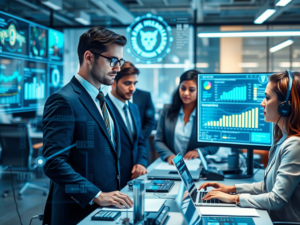 Artificial Intelligence is rapidly transforming the face of the business world—and Human Resources is not far behind. From being a function governed by instincts and personal relationships, HR today finds itself in the midst of a data-driven, automated, smart algorithm-driven revolution. From scanning thousands of resumes in seconds to identifying which employees are most likely… Read more: Artificial Intelligence in HR: How AI Is Reshaping the Future of Human Resources
Artificial Intelligence is rapidly transforming the face of the business world—and Human Resources is not far behind. From being a function governed by instincts and personal relationships, HR today finds itself in the midst of a data-driven, automated, smart algorithm-driven revolution. From scanning thousands of resumes in seconds to identifying which employees are most likely… Read more: Artificial Intelligence in HR: How AI Is Reshaping the Future of Human Resources - The Rise of AI Copywriting: A New Era in Content Creation
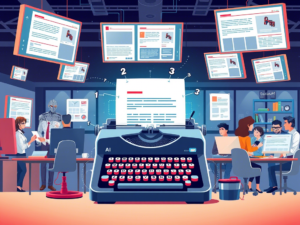 In today’s digital world, content is queen—and creating it at scale is a constant challenge. That’s where AI copywriting enters the picture. Powered by artificial intelligence and natural language processing, AI copywriting tools can create blog posts, ad copy headlines, product descriptions, and more in seconds. But it’s not just a question of velocity. AI… Read more: The Rise of AI Copywriting: A New Era in Content Creation
In today’s digital world, content is queen—and creating it at scale is a constant challenge. That’s where AI copywriting enters the picture. Powered by artificial intelligence and natural language processing, AI copywriting tools can create blog posts, ad copy headlines, product descriptions, and more in seconds. But it’s not just a question of velocity. AI… Read more: The Rise of AI Copywriting: A New Era in Content Creation - SEO and AI: How Artificial Intelligence Is Reshaping Search Engine Optimization
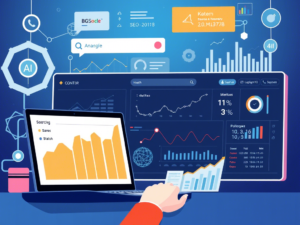 Search engine optimization (SEO) has never been anything but being ahead of the curve—but with artificial intelligence (AI) gaining momentum, that curve is accelerating faster than ever before. From smarter keyword research to real-time optimization, AI is no longer on the horizon for SEO. It’s already here, and it’s changing everything. As search engines like… Read more: SEO and AI: How Artificial Intelligence Is Reshaping Search Engine Optimization
Search engine optimization (SEO) has never been anything but being ahead of the curve—but with artificial intelligence (AI) gaining momentum, that curve is accelerating faster than ever before. From smarter keyword research to real-time optimization, AI is no longer on the horizon for SEO. It’s already here, and it’s changing everything. As search engines like… Read more: SEO and AI: How Artificial Intelligence Is Reshaping Search Engine Optimization